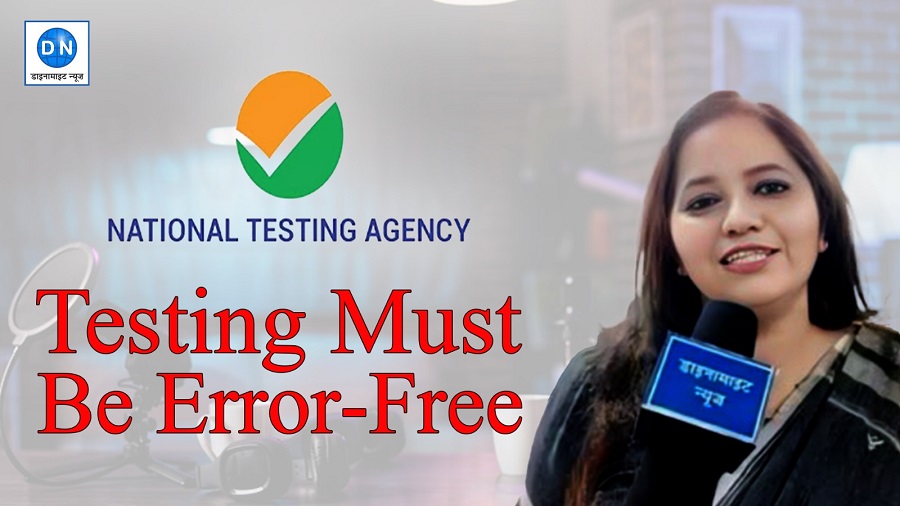NTA Fiasco: An Opportunity For Introspection And Reflection
The National Testing Agency (NTA) has completely failed to conduct the NEET-UG and UGC-NET exams, efficiently and smoothly. Read further on Dynamite News Blog:

In the last few days, the National Testing Agency (NTA), an autonomous body under the Ministry of Education, has been involved in a series of controversies that have severely impacted students across the length and breadth of this country. The body, entrusted with conducting various entrance exams for higher education throughout India, has been in the crosshairs due to the allegations of several irregularities and unfair practices in its examination centre.
The NEET results declared on June 4, immediately led to a furore among the aspirants all over the country. Several issues were raised, such as the awarding of grace marks to more than 1,500 students, an unusually high number of students getting perfect scores and above all the allegation of a leaked question paper.
The National Testing Agency (NTA) has completely failed to conduct the NEET-UG and UGC-NET exams, efficiently, smoothly and in an error-free way. This whole incident has not only shaken the confidence of the students but has also cast a shadow of doubt on the integrity of the examination process itself.
Though NTA’s chief was suspended, and an investigative panel was formed, all this appeared more like compulsion than genuine efforts to cater to the actual issue.
At this crucial time when stakeholders are desperately asking for transparency and accountability, it remains to be seen whether these actions are enough to truly restore faith in the assessment process or if they remain mere cosmetic fixes to dodge the public outcry. The outcome of these deliberations could potentially redefine the landscape of higher education admissions in India if they are tackled with integrity and equity in the assessment process.
The question now is not limited to NEET and NET only but poses some consequential and pertinent questions on our education system as well. The NTA is the same agency which conducts CUET (Common University Entrance Test) UG and PG, which is a gateway for students to get into universities and colleges for graduate and postgraduate courses, respectively.
Also Read |
DN Exclusive Discussion: NEET-UG Row - What is the controversy all about? Any solutions?
First of all, the need for an entrance test like this is in itself an irrational requirement considering the students have already given their qualifying examination before applying to a university. On average, an Indian student spends 14 years of his school life, and if those 14 years are not enough for us to measure the level of their intelligence or abilities, then how come we can do the same in a few hours?
The assumption that whoever performs better in the entrance test would be the most deserving one, is also not correct. In reality, what an exam like this leads to is a situation where you’re giving excess importance to an entrance exam that stretches for a few hours over the individual’s whole schooling.
One could argue that the purpose of introducing such a system was to measure the abilities of the students from all over India, from whichever states they may be, on one common scale i.e. CUET Score. Because purportedly few boards were more generous in allotting marks to their students as compared to the others which posed a big problem.
But would it not have been more prudent, that rather than creating an altogether new system, the state would have strengthened the existing educational structure and introduced some norms which should have been followed by the educational boards all across the country to bring in more uniformity and transparency?
One more way, it could be looked at is that the centre thinks that the educational boards or the schools are not competent enough to gauge the abilities of its students that it has taught and groomed in over a decade, which in itself is a problematic approach to start with. It's not only limited to this, but adding another layer to the education system has serious financial implications as well, both for the state and the students.
The Examination fee that the NTA charges has the potential to create an educational divide, which is contrary to its claim of making education more inclusive.
Also Read |
NEET row: NTA's response on time limit to raise the grievances pertaining to OMR sheets
This is one of the perfect examples as to why the state by all means should avoid any knee-jerk policy interventions, which may have the potential of jeopardising the lives of millions of students throughout the country.
The NTA fiasco that has taken the country by storm should be looked at as an alarm bell reminding us of all the vulnerabilities that have marred India's education system for so long.
However, it also gives all of us an opportunity for introspection and reflection, which can lead us to much-needed reforms. By implementing stringent security measures and bringing in more transparency combined with technological advancements, we can shift towards a more comprehensive and holistic approach. In this way, India can pave its way for a brighter future where every student has a fair chance to succeed based on merit and hard work.
This should be the hour of introspection and reckoning for all of us so that the future of our youth is not compromised.
(The author of this article is Mrs Jyotika Kalra Advocate, Supreme Court & former Member NHRC)
 Dynamite News
Dynamite News 